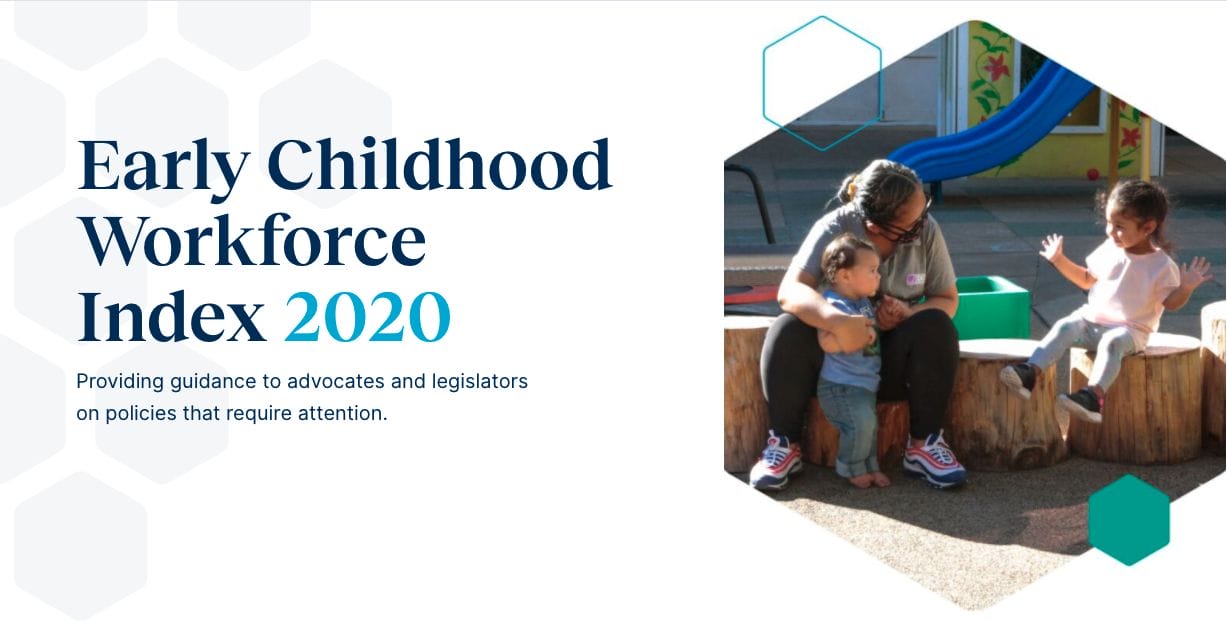BERKELEY, Calif. – Inadequate levels of public financing and heavy reliance on families to cover the costs of early care and education (ECE) result in economic distress for many women who care for and teach children from infancy through preschool, according to a new report released today by the Center for the Study of Child Care Employment (CSCCE) at the University of California, Berkeley. The report finds this especially true for women of color, who comprise about 40 percent of this workforce and earn the least. Even after controlling for educational attainment, African American early educators still earn $0.78 per hour less than their white counterparts.
Today’s decision in the Supreme Court case Janus v. AFSCME will likely deal another blow to teachers of young children. The median wage for center-based teaching staff who reported being a member of a union was $17.39 per hour compared to $11.00 per hour for those who reported not being a union member. More than one-third of workers making $20 or more per hour are unionized, compared to less than three percent of those making between $7.25 and $10.09, based on figures from 2012, the most recent year available.
The 2018 Early Childhood Workforce Index provides a comprehensive update to the inaugural 2016 Index on the progress made by states to improve conditions for the early care and education workforce. It finds that strides have been made in improving education and training levels of the ECE workforce, but they are largely not linked to policies and resources that address teachers’ economic well-being. This condition has persisted despite widespread recognition of the importance of early care and education in shaping children’s development, promoting the health of families, and building a strong economy.
In light of increased national attention to gender pay gaps, the Index highlights an egregious pattern: because early childhood education is regarded as women’s work, with jobs almost exclusively performed by women, it pays so poorly that significant economic and food insecurity have been reported in many states. In a 2017 Arkansas survey, four in 10 teachers noted they skipped meals or cut meal sizes to make food stretch.
The younger the age of the child cared for, the lower the pay. Overall, 86 percent of center-based teaching staff working with infants and toddlers earned less than $15 an hour, compared to 67 percent of those working with only preschool-age children (three- to five-year-olds).
Index authors echo a recent National Academies of Science, Engineering, and Medicine report that established a broad consensus for funding ECE for children from birth to kindergarten entry as a public good, equivalent to K-12.
“A skilled and stable early education workforce is essential to our nation’s infrastructure,” said Dr. Marcy Whitebook, co-director of CSCCE and one of the authors of the report. “Just as we accept the importance of investing in other parts of our infrastructure like roads, libraries, and K-12 education, it’s imperative that we build the public systems required to deliver quality early care and education to our nation’s youngest children.”
“For too long, the lack of public support for this critical education has generated poverty in the workforce, stressed parent incomes, and resulted in uneven care for kids,” said report co-author Dr. Lea Austin. “It’s time for a new national financing structure for early care and education.”
The 2018 Index reviews current workforce conditions and policies across states and notes changes since 2016. It includes new analyses, such as earnings data for preschool/childcare directors as well as wage and opportunity disparities faced by groups of early educators based on race/ethnicity and program funding. It also reviews the role minimum wage legislation has played in increasing wages. States are grouped into three tiers based on an assessment of their policies: stalled, edging forward, and making headway.
The Index provides practical policy solutions that policymakers, business and labor leaders, and educators can use to address the crisis of low wages and economic insecurity among early childhood teachers and the lack of affordable, high-quality services for children and families in the United States.
Key findings include:
- Since the first Index was released in 2016, most reforms have focused on raising qualifications for early educators. However, limited attention to improving work environments and compensation impedes progress, hampering teacher practice, children’s learning opportunities, and the ability to recruit and retain a skilled ECE workforce.
- Teacher economic insecurity remains common across the profession. This condition has persisted despite widespread recognition of the importance of early care and education in shaping children’s development, promoting the health of families, and building a strong economy.
- Wages have been marked by uneven changes across the workforce. State-by-state data on earnings for the ECE workforce are available for three groups: child care workers, preschool teachers, and center administrators. More than half the states saw a decrease in preschool teacher and center director median wages when adjusted for inflation. Child care workers’ wages, on the other hand, have slightly increased.
- States that raised their minimum wage between 2015 and 2017 were more likely to show wage increases for child care workers than those that had not.
- Teachers with bachelor’s or graduate degrees can face a wage gap as high as $6 an hour, depending on their program’s funding source and sponsorship, compared to a maximum average wage gap of $4 for teachers with an associate degree or no degree.
“Early educators’ skills, knowledge, and well-being are inseparable from the quality of children’s early learning experiences. Yet our system of preparing, supporting, and rewarding early educators in the United States remains largely ineffective, inefficient, and inequitable,” according to report co-author Dr. Caitlin McLean.
While there is scientific consensus that early childhood education is central to shaping children’s lifelong knowledge and skills, the authors found that policies in the 50 states and Washington, D.C., continue to fall short on a number of measurable indicators.
The Center for the Study of Child Care Employment conducts research and policy analysis focused on achieving comprehensive public investments that enable and reward the early childhood workforce to deliver high-quality care and education for all children. For more about CSCCE, visit http://www.irle.berkeley.edu/cscce/.



